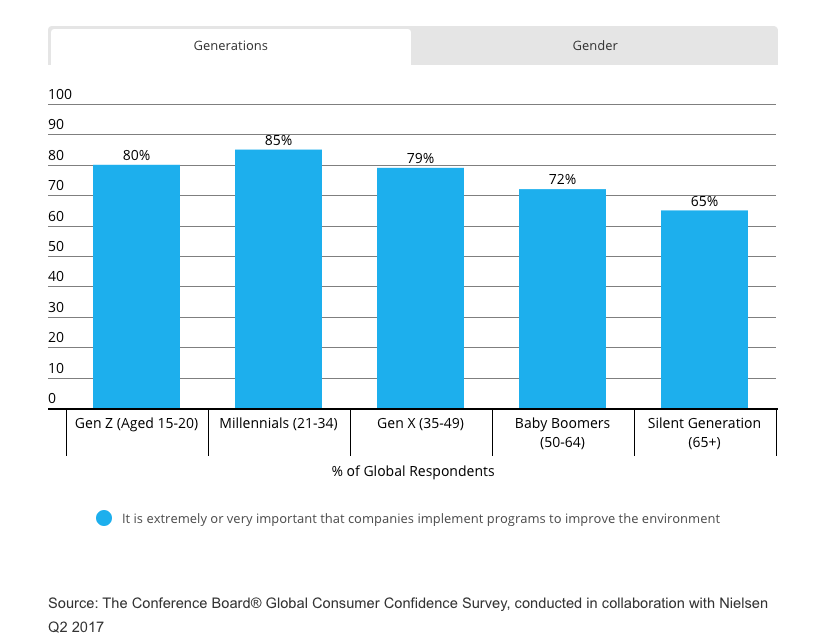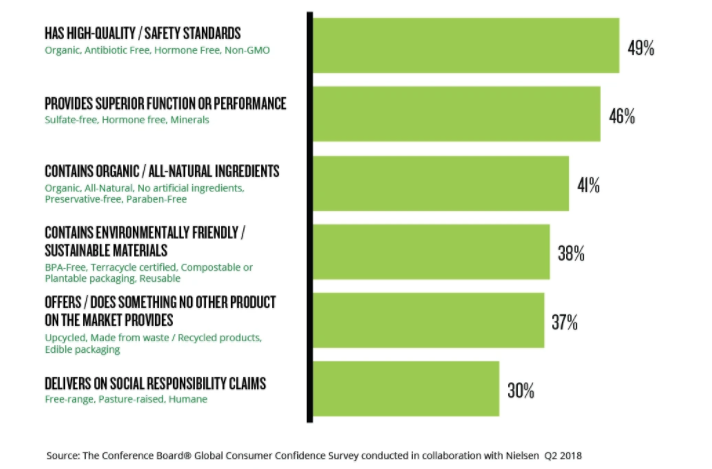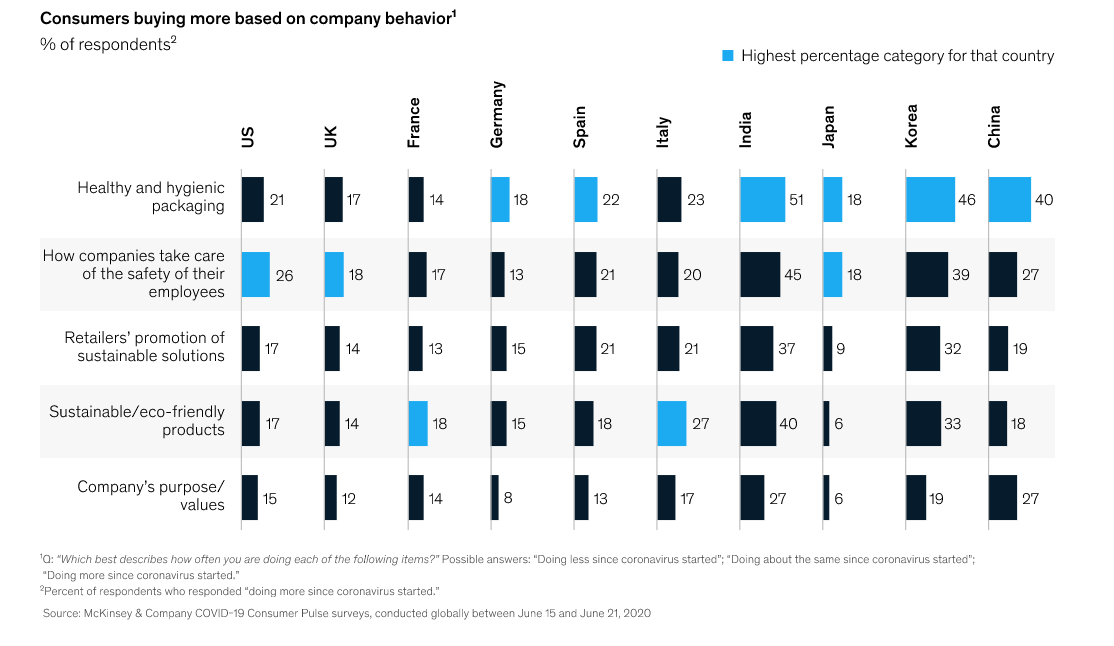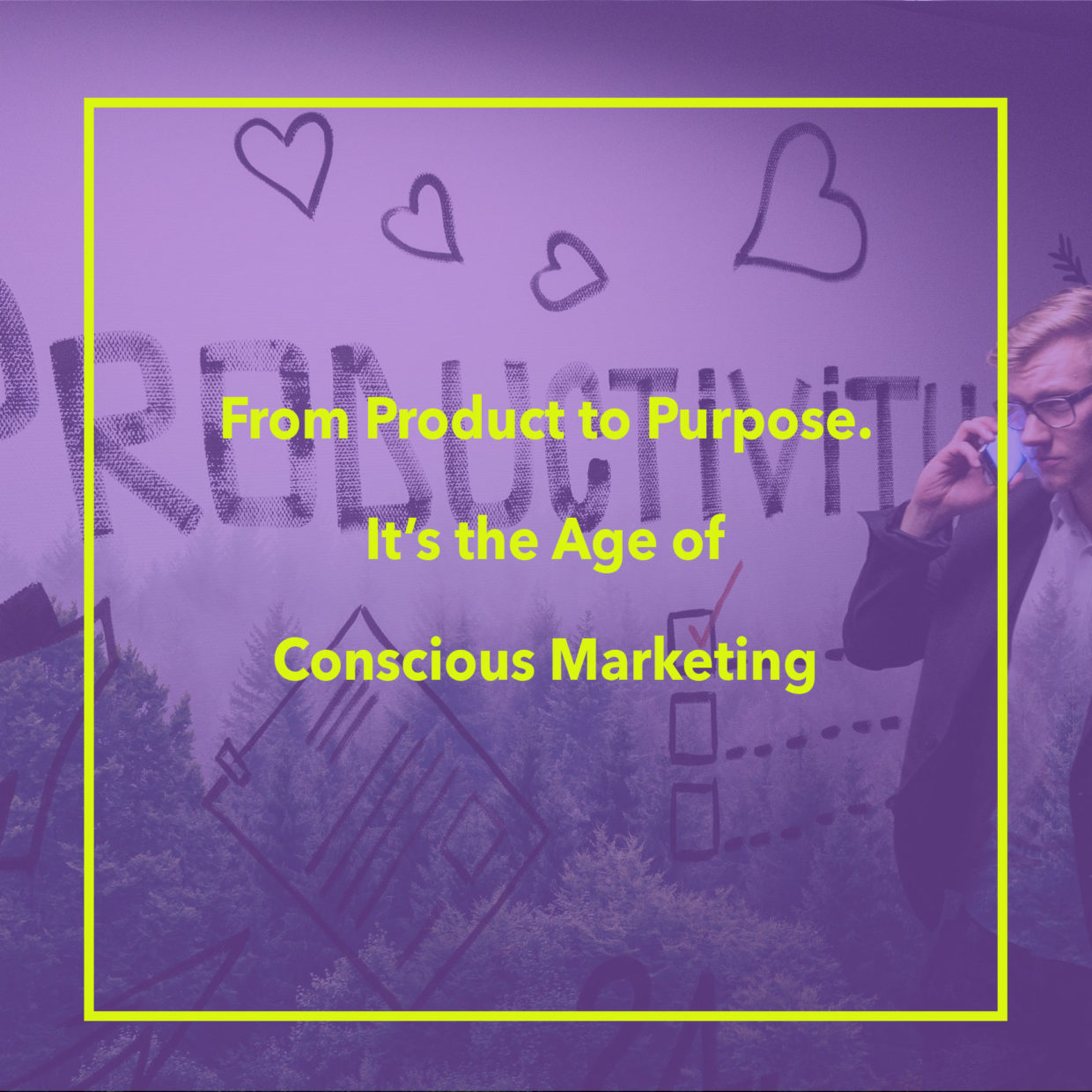Conscious marketing, mindful marketing, social impact marketing, cause marketing, ethical marketing, these terms have been increasingly popping up in articles for professional marketers, for the last decade. Lately, even many marketing influencers, those who built their fortunes on articles such as “How to rank in the top 5 and make millions” have changed their tune to “Find wisdom, Live in happiness and make customers love your product”. Something is definitely afoot.
The increasing popularity of these new forms of marketing is undoubtedly due to the combined effects of changed consumer behaviors and preferences, and the emergence of corporate social responsibility practices, whether under the pressure of their customers or by enlightened leadership choices, that are proving effective in delivering superior corporate profits and resiliency.
As business and consumers are changing so must the in-between that is marketing. The field of conscious marketing is clearly as large as marketing itself, so for the purposes of this first article, I will examine just the factors that are supporting its growth and its general principles.
Marketing is about analyzing buyers’ motivations and markets, and build successful strategies on them, therefore I will discuss what has been pushing companies and customers to evolve in this direction. But first we need to understand what exactly are these new definitions of marketing.
Definitions and differences
Let’s start by defining these new forms of marketing and their differences.
Ethical marketing focuses on transparent, honest and responsible representation of products or services, considering also the cultural and social context in which they are delivered. The emphasis here is on the moral aspects of marketing and the business. Example is all messaging related to fair trade or cruelty-free products like the trailblazer The Body Shop.
Cause marketing is usually employed by a for-profit business that aims to sell its products and to improve society in accordance with some form of corporate social responsibility, usually by including activist messages in advertising. In this case the ethical message is mostly limited to specific campaigns. The most famous example is the award-winning Nike’s campaign “Dream Crazy” featuring Colin Kaepernick.
Social Impact marketing’s emphasis is on creating positive social change in the communities that are reached by the company’s services/products. In this case the emphasis is on the social effects of the product or service. Example: TOMS footwear and Warby Parker.
Sustainability (or also Sustainable) marketing consists of strategies aimed at fostering corporate and consumer behaviors that are consistent with sustainable development. Sustainable marketing encompasses the triple bottom line of: environmental, social and economic factors. The emphasis in this case is on adherence to sustainable development objectives, examples are plastic-free products, but also fair trade.
Mindful marketing aligns sellers and buyers interests in a truthful, thoughtful way, but without environmental, social or economic considerations. An example is the Dove Campaign for Real Beauty
Conscious marketing is about building a business based on the awareness of the value of its products and services throughout their life cycle. It encompasses environmental, economic and social factors not only in the perspective of sustainable development but of aligning them with shared ethical values and purpose. Example: Dr. Bronner’s.
This table sums up the differences explained above, and I added traditional marketing as a reference.
| Focus | Principle | |
| Ethical marketing | Customer relations | Morally honest messaging |
| Mindful marketing | Customer relations | Alignment of values |
| Cause marketing | Specific cause | Social betterment |
| Social impact marketing | Social effects | Social betterment |
| Sustainability marketing | Environmental, social, economic effects | Sustainable development |
| Conscious marketing | Environmental, social, economic effects | Ethical, social, environmental betterment |
| Marketing | Market growth | Profit |
Conscious Consumers
Since the beginning of the third millennium one of the major trends affecting the CPG markets in the most advanced (and wealthiest) economies has been the rise in popularity of “green” products, especially among the Gen Z and Millennial generations – which will be the future markets.
In 2017, a survey conducted by Nielsen found that 81% of global consumers were in favor of companies implementing programs to help the environment, with Millennials topping the chart with 85% of them supporting eco-friendly products.

Unfortunately, as Italians like to say “Tra il dire e il fare c’é di mezzo il mare“, that is: easier said than done (literally: the sea is between saying and doing), because these preferences are not always backed by a correspondent personal commitment, especially if it means paying higher prices for the same products.
This chart by Nielsen illustrates consumer’s willingness to pay higher prices for sustainable, responsibly produced goods.

The search for ethical brand values beyond wants and needs goes beyond CPG goods and environmentally friendly products and it extends to scrutinizing corporate values and behavior.
The 2018 Cone/Porter Novelli Purpose Study highlighted that 89% of Americans believe that corporations should also behave consistently with shared environmental and social goals through Corporate Social Responsibility policies; while 85% of US consumers also welcome ethical business behavior when it comes to brand strategy and its social impact.
[/vc_column_inner][/vc_row_inner][vc_row_inner inner_container=”true” no_margin=”true” padding_top=”0px” padding_bottom=”0px” parallax=”true” bg_image=”9347″ bg_video=”” class=”” style=””][vc_column_inner fade_animation_offset=”45px” width=”1/4″][/vc_column_inner][vc_column_inner fade_animation_offset=”45px” width=”3/4″ id=”” class=”” style=””]
In a world that’s changing faster than ever, and that is more uncertain than ever, purpose acts as a “North Star”.
[/vc_column_inner][/vc_row_inner][vc_row_inner padding_top=”0px” padding_bottom=”0px”][vc_column_inner fade_animation_offset=”45px” width=”1/1″]
Conscious Business
The case for a holistic approach to business has been covered in much literature since the end of the 20th century especially from an environmental point of view, and I am glad that it is finally starting to gain momentum.
It might be because the planetary disaster that is looming upon us will require everyone to act to prevent it. It might be the awareness that the world resources are finite, therefore a system built on infinite economic growth, and the profits associated with it, might not really be an option in the future. Or finally, it might be because purpose-driven companies are proving to be more profitable and resilient than their profit-driven competitors. Whatever the reasons, nowadays the majority, if not all, the Fortune 500 companies boast their Corporate Social Responsibility policies in their annual reports.
However, Corporate Social Responsibility has been criticized by many as a mere palliative for many corporations. Indeed, voluntary community outreach by employees, or timid paper recycling initiatives are very far from instilling purpose within each part of the organization. This might be especially true for B2B companies that don’t face consumer pressure to do good. In this regard, the recent B2B Business Purpose Paradox Report by ANA/Cone/Harris Poll has found that there is a wide gap between Stated Purpose and Activated Purpose: while 86% of respondents said that purpose was important to their company, only 24% said it was embedded in their business.
Many businesses are still struggling to decide between the pros and cons of embracing purpose within their organization.
The B2B companies that decide to push their purpose beyond CSR are mainly motivated by these top three reasons:
- Greater success than those without (82%)
- Supports recruiting (75%)
- Motivates sales teams (71%)
On the other hand, according to the same research, 56% of businesses are still held back by the perception that purpose is nothing more than a PR exercise, while 51% think it doesn’t add any competitive advantage to their operations.
These ambivalent attitudes towards purpose seem to be partially due to differences in industry and age. The B2B Purpose Paradox identified two psycho-demographic subsets: the Believers (21%) and the Doubters. These categories are defined on the basis of their strong agreement/strong disagreement with the statement “I believe that if my company focused on our purpose we would be more successful.”
[/vc_column_inner][/vc_row_inner][vc_row_inner padding_top=”0px” padding_bottom=”0px”][vc_column_inner fade_animation_offset=”45px” width=”1/2″]The Believers
- Younger: majority 25-54
- Male (58%)
- Mid- to Mega-sized companies (500-20,000+ employees)
- Manufacturing and tech/telecomms industries
- Marketing, communications, and external affairs roles
The Doubters
- Older: majority 35-64
- Male (67%)
- Small – to large-sized companies (100-19,999 employees)
- Professional services and manufacturing industries
- Sales roles
 [/vc_column][vc_column fade_animation_offset=”45px” width=”1/2″]
[/vc_column][vc_column fade_animation_offset=”45px” width=”1/2″]Globally, 86% of all adults surveyed agree that, “I want the world to change significantly and become more sustainable and equitable rather than returning to how it was before the COVID-19”.
World Economic Forum/Ipsos Global Survey, September 16, 2020
[/vc_column][/vc_row][/vc_section][vc_row padding_top=”0px” padding_bottom=”0px”][vc_column fade_animation_offset=”45px” width=”1/1″]The New Normal
Finally, let’s take a look at today. COVID-19 has certainly shaken up things for most businesses and people, and if anything it seems to have reinforced the yearning towards a fairer system towards people and the planet.
A survey just published by IPSOS for World Economic Forum has found that 86% of adults in 27 countries worldwide “want the world to change significantly and become more sustainable and equitable rather than returning to how it was before the COVID-19.”
It also comes without surprise that until the pandemic persists, for many consumers price once again is an important factor as a research by McKinsey found last July 2020.
However, even during though times such as as these, consumers have shown to prioritize also values such as safety and caring for the employees’ health in their purchasing decisions. As the report concludes “[…] Consumers have a heightened awareness of how businesses interact with stakeholders, local communities, and society more broadly. The actions that businesses take during this pandemic are likely to be remembered long after COVID-19 has been conquered.” So even if business purpose is not a determining factor, it remains on the customers’ radar as the numbers in the table below show, the implementation of ethical values -such as guaranteeing healthy working conditions, and social values, i.e.: product safety, is. Furthermore, the values prioritized by businesses will affect purchasing decisions even after the end of the pandemic.

Another survey on sustainable fashion conducted in Germany and UK during the peak of the COVID-19 pandemic in April 2020, found that almost 9 out of ten (88%) of respondents believe that more attention should be paid to reducing pollution. 57% declared to have made significant changes to their lifestyles to lessen their environmental impact, while more than 60% report going out of their way to recycle and purchase products in environmentally friendly packaging.
As regards corporate behavior during the pandemic, 55 % of respondents expected fashion brands to take care of the health of their employees, while 38% thought they should contribute more to help the low-paid factory workers in Asia.
These COVID-enhanced social and environmental concerns are not limited to consumers, but they seem to have reached also the very conservative group of institutional investors.
According to Bloomberg, four companies from the Russell 3000 had environmental proposals receive a majority of support from investors during the 2020 annual meeting season. That’s four times more than in 2019, when no environmental policies received a majority of shareholder support.
Several proposals focused on social issues, such as human rights and diversity on the board, have also received a majority of shareholder support in 2020.
A deciding factor for this change of attitude might be the fact that analysts found that 56% of sustainable funds outperformed their peers in the second quarter.
[/vc_column][/vc_row][vc_row padding_top=”0px” padding_bottom=”0px” parallax=”true” bg_image=”9377″ bg_video=”” class=”” style=””][vc_column fade_animation_offset=”45px” width=”1/1″][vc_column_text css=”.vc_custom_1600981507867{margin-right: 2em !important;margin-bottom: 1em !important;margin-left: 2em !important;padding-top: 1em !important;padding-bottom: 1em !important;}”]Happiness lies in the joy of achievement and the thrill of creative effort.
Franklin D. Roosevelt
[/vc_column_text][/vc_column][/vc_row][vc_row padding_top=”0px” padding_bottom=”0px”][vc_column fade_animation_offset=”45px” width=”1/1″]Beyond Contradictions
There is no doubt that traditional capitalist values that put profit as the ultimate goal, and indicator of merit, are hard to overcome. They have been ingrained in our culture, in our education system, in our religious values for over five hundred years. Economic policies are still designed around GDP growth as the essential goal, we’ve been raised to believe that economic success and overconsumption are the path to happiness.
However, there are signs that the paradigm is shifting as these issues are increasingly discussed by business analysts as the wealth of surveys and I was able to find to write this article proves. The COVID pandemic might be just that decisive push that tips the scales. The next few months will be of vital importance to see how we, as a human race, decide to evolve coming out of this health crisis to face the climate challenge for our future.
This paradigm shift is challenging marketers to look beyond the traditional 4 Ps, to capture the values and effects of the entire product lifecycle, to actively promote a new inclusive and holistic business culture that can engage all its stakeholders.
As a serial entrepreneur I have learned that success happens when values and beliefs align with your offering. That’s the sparkle that motivates the creativity, the energy that pushes you to go beyond your comfort zone, to leave behind the nay-sayers and achieve your dreams. And this is true for any job, any position; when there is a deeper connection to the final goal, something that makes it meaningful for us, our productivity and ingenuity spike up. Humans are spiritual beings, and once the basic physical needs for survival are satisfied – as it is in the most advanced economies, emotional and spiritual fulfillment are next in line for motivation and happiness. COVID-19 has brought to light the the dangers over-population and over-exploitation of the planet’s resources, people are now demanding change to re-align with the values of collective survival and preservation of the quality of life achieved so far. Only the business that will adapt to this change in priorities can expect to thrive in the post-COVID world.
And this brings me to the title of this article: marketing and advertising agencies are currently unprepared to the changes that are happening in their stakeholders’ worlds.
Besides a very few houses specialized in cause marketing or the occasional clever campaign that hitches a ride on ongoing social conversations, agencies are mostly lacking the specialized in-depth knowledge that is needed to help companies meet their customers’ expectations in terms of social, ethical and environmental values. Now it would certainly be a great time to start put together some their best strategic minds and plot the way ahead for the creation of their sustainability marketing departments.
